- Home
- T. H. White
Darkness at Pemberley
Darkness at Pemberley Read online
Diagram of Old Court area
DARKNESS AT PEMBERLEY
by
T. H. WHITE
NOTE
When this book was in page proofs it was suggested to me that the rather obvious local identification with a real college was unfortunate, not so much on account of possible libel against particular members of the college (for no real person in the college could possibly be identified with anybody in this book) as because it might tend to give a curious idea of the college in general, to those who were not acquainted with it. It therefore seems best, although it scarcely seems necessary, to state explicitly that the only connection which the college in this book has with reality is the local one. No person in the real college would be in the least likely to write incriminating letters, or to take drugs, or to commit blackmail or murder. These are the figments of the detective story convention. Imaginary characters and events were grafted upon a real place because it seemed amusing to plan a fiction within the local limits of a fact.
PART I
CHAPTER I
Mr. Mauleverer stood in the middle of the Old Court and shouted upwards to the occupier of C4. The latter poked his head out of the window and answered: "Coming!" Then the head disappeared; the light swallowed itself with a leap; footsteps echoed on the wooden stairs. Mr. Mauleverer was taking the occupier, an undergraduate named Weans, to the Festival Theatre. He was also taking Mr. Beedon, the history don whose rooms were on A staircase.
As they moved up the court Mr. Mauleverer said: "There's a light in Beedon's room. Just run up and see if he's ready." Weans ran up the stairs and turned to the right at the first landing. Mr. Beedon's rooms were on the first floor, with windows looking over the court on one side and across Copper Street on the other. The landing opposite Mr. Beedon's door was very narrow and unlighted. Weans could scarcely make out the white letters MR. BEEDON above the door. The door was sported, and he knocked. There was no answer. Weans conscientiously said the Lord's Prayer and knocked again. After a minute he clattered down the stairs to Mr. Mauleverer and said: "Mr. Beedon's door is sported. I can't make him hear."
The two stood on the cobbled pathway opposite the lighted window and shouted "Beedon!" in unison. Still no reply.
"How very remiss of him," said Mr. Mauleverer. "I do think he might have remembered an invitation to the theatre. I expect he's in his study: the one with the window on the other side."
Weans asked helpfully: "Shall I go round to Copper Street and shout from there?"
"No, no! We'll go up and see if we can't make him hear through the door."
Two pairs of footsteps clumped up the stairs again and halted in the darkness of the tiny landing. Mr. Mauleverer called "Beedon! Beedon!" and thumped the door with his umbrella. He stooped down and tried to pull the door open—there was no handle—by inserting the tips of his fingers into the T-shaped keyhole. But it was locked.
"What a nuisance!" exclaimed Mr. Mauleverer. "How very boring! One more shout together":
"Beedon! Bee-don!"
In the silence which followed, a gramophone began to play inside the room.
"Really!" said Mr. Mauleverer, "if we can hear his gramophone he can hear us. How stupid! I suppose he's forgotten all about the theatre and thinks this is a rag or something." Then, raising his voice and giving another bang with his umbrella: "Beedon! What about the theatre?"
The gramophone went on playing without interruption. Muttering something about rudeness, Mr. Mauleverer led his companion down the stairs again: started for the Festival Theatre in an irritable frame of mind.
The serious undergraduate in the rooms above Mr. Beedon's shut his book with a sigh, switched off his light and came lumbering down the stairs. He had worked nine hours and felt that a walk to Grantchester before eleven would do him good. He knew that he must be careful not to overdo it. There was a car in Copper Street, and a small crowd of people. He passed by on the other side, since he disliked accidents, and tramped the boring road to Grantchester, thinking about Byron's "Don Juan" and its Relation to Restoration Comedy.
The Master of the college pottered into the Old Court five minutes later and made for Beedon's rooms. He stood on the dark landing for some time, wheezing a little, and slipped something into Beedon's letter box. There was silence inside the room, except for a thin scraping or swashing noise, like somebody mowing rhythmically with a scythe, only fast and quietly. The Master tiptoed down the stairs, looked out under the archway, and, seeing nobody about, walked quickly to the centre of the Court. There he resumed his shuffle and disappeared in time towards his own Lodge.
At about half past ten the Chaplain, biting his fingers nervously, made his way up the stairs and stood opposite Mr. Beedon's door. He did not knock. As he waited, the telephone bell rang inside. There was no answer. The Chaplain looked over his shoulder and, taking his sport key out of his pocket, fitted it into Mr. Beedon's lock. It fitted. The Chaplain opened the door half an inch, so that a beam of light struck across the landing. Apparently intimidated by this, he stood hesitating for a moment. Then, closing the door again with infinite precaution, he also tiptoed down the stairs.
Finally, at midnight, the porter Rudd went round to turn off the lights on the staircases. He did not content himself with turning off the light at the bottom of A staircase, but went up to the landing and stood for a few moments opposite Mr. Beedon's door, in silent reflection.
*****
Some four hours earlier the telephone had rung in the local police station. The Inspector took off the receiver, and answered briefly. After the thin voice had trickled and clattered for a minute he said: "What address?" His pencil moved over a pad which he had drawn towards him. The tinny voice stopped, and the Inspector repeated: "23 Copper Street. Right. I'll be over." He replaced the receiver and reached for his hat. Considering that he had just been told of the discovery of a murdered man, the Inspector's phlegm was admirable. His seamed muscular face betrayed no excitement; the jaw set with no more than its usual taciturnity. Inspector Buller moved through his duties as a policeman without faith in his fellow men, and with some doubts of the world in general. He had seen so many witnesses shaken that he believed the testimony of his own senses only with difficulty. He had been told there was a murder. Very well. There might be, and there might not. He would be sure of it when he had seen the murderer hang. Meanwhile he reached for his hat, tersely summoned a sergeant and two constables, and drove to Copper Street.
The constable in charge saluted respectfully, and the Inspector gravely returned the salute. "Well," he said, "what happened?"
The constable opened his note book and began: "When passing over Copper Street bridge on my beat at 8.3 p.m. this evening I was accosted by a woman who gave her name as Mrs. Button, lodginghouse-keeper of 23 Copper Street, who stated that there was a dead body in her house. I immediately accompanied witness to the above address and found the deceased as stated. I proceeded to lock the door of the room in which the body lay and telephoned the police station from the provision merchant's at Number 24 Copper Street. Whilst awaiting the Inspector I stationed myself outside the door of the deceased's room, having cautioned Mrs. Button not to leave the house."
"A very good report," said the Inspector. "Did you 'phone for a doctor?"
"No, sir. I deemed from the condition of the deceased that it would be unnecessary."
"Very good. Go and 'phone for the police surgeon now. Where is Mrs. Button?"
"Mrs. Button is weeping in the dining-room, sir."
"Well, we'll give her time. Where is the body?"
The constable opened the door behind him. The group of men, who had been standing on the first floor landing, filed in carefully. The body was lying on the floor, huddled and
suddenly collapsed. On its face was an expression of surprise and fear, accentuated by the blue hole of a bullet directly between the eyes. The back of the head lay neatly upon what remained of its brains, barely staining the carpet. Nothing in the room seemed to be disordered. There was no weapon. Buller locked the door with the key which the constable had left, and went downstairs to the dining-room.
Mrs. Button was a small straggling woman, much more like a bedder than a proprietress in a prosperous thoroughfare like Copper Street. She had dried her tears by the time the Inspector came down and, though still slightly hysterical, was agog with curiosity. However, she made an effort to remain distressed.
"I'm sorry, Mrs. Button," said the Inspector, "to have to trouble you with questions after a shock like this, but we must get to the bottom of it. Can you give me a little information?"
"I'm sure I'll answer anything as I can, sir, for the poor young gentleman's sake. He was a real nice spoken young man, and never gave no trouble for a moment. Whoever can have had an interest in doing away with him is more than I can say!"
"Ah, no motive," Buller replied tactfully. He pretended to make a note of it. "Now I gather from his things that he was an undergraduate from St. Barnabas. What was his name?"
"He was a Mr. Frazer. These was his first lodgings."
"A freshman called Frazer from St. Barnabas. Now would you tell me how you found him?"
"Oh, Inspector!" exclaimed Mrs. Button tearfully. "It do seem like a judgment, for I was out at the Crown Arms just round the corner for a drop of brown ale! Mr. Frazer, he would have been to first Hall, and I'd heard him come back quite usual, something after half past seven it must have been, and go up to his room!" Mrs. Button dissolved into tears again. After a patient pause the Inspector prompted her.
"Well, what happened? You went round to the Crown Arms."
"I can't have been there more than twenty minutes, for I had it on me mind that Mr. Frazer's fire needed seeing to, and he wasn't one that remembered to put the coal on himself. So I only had a glass of brown ale, for I remember Mr. Rudd remarking on it, and came right back at once to take up the scuttle. I had it on me mind to go back again afterwards, if need be. And then, when I took it up, there was no answer to the door, and I found the poor fellow lying there horrible. Did he kill himself, Inspector?"
"That's what I want you to tell me, Mrs. Button. Had he any reason for doing so?"
"Not the least in the world, he hadn't," said Mrs. Button. "He was that cheerful always, and that respectable! Why, I'd as likely kill myself!"
"Had he a revolver, or anything of that sort, do you know?"
"That he hadn't. I know, for I did all his drawers for him."
"He hadn't anything of a queer shape, had he? Anything like a flat sort of revolver with a contrivance on the end of it?"
"He hadn't an automatic with a silencer, if that's what you mean," replied Mrs. Button, with the dignity of a confirmed cinema goer.
"Oh," said the Inspector. "What sort of friends had he?"
"Just the usual sort. Only two or three. He was a freshman."
"Nothing strange about him, or them?"
"Nothing at all."
Nor did the Inspector gain any further information from Mrs. Button.
*****
Inspector Buller was ushered into the senior tutor's room at St. Barnabas. When he had told the senior tutor the news, and given him time to recover his balance, he asked for information.
"Did you ever meet the boy's parents?" he asked.
Mr. Witherspoon, the tutor, had resumed his air of a hostile solicitor. "No," he said, "I never met them. I corresponded with them. Colonel Frazer was in the Indian Army. I believe they were both quite ordinary people."
"No chance of a vendetta, or a diamond stolen from the idol's eye, or anything of that sort?"
"Not in the least, I should think. They live at Croydon. Frazer was reading Agriculture."
"Well, it seems a most extraordinary crime, Mr. Witherspoon. There is no weapon, and the police surgeon says he can't have shot himself from the nature of the wound. He seems to have been a perfectly normal young chap, and nobody can give me any motive for a murder. Have you any theory or suggestion which would help us along?"
"I was not trained as a detective, Mr. Buller."
CHAPTER II
Mrs. Grigg, the senior bedder of A staircase, allowed herself the prerogative of arriving nearer seven than six o'clock. The college gates opened at six, when the bedders were supposed to arrive, but Mrs. Grigg had been a servant of the college so long that she was allowed a little latitude. Thus it fell to the lot of Miss Edgeworth, Mrs. Grigg's help, to perform the preliminary ministrations alone. Her routine was to begin with the fireplaces, starting at the bottom of the staircase. She reached Mr. Beedon's room at twenty past six, put down her brushes, and fumbled with the key. At twenty-one minutes past six a horrible scream swept through the sleeping court, followed by a clattering of feet and the debouch of Miss Edgeworth on the cobbles, in hysterics.
Mr. Beedon was sitting in his favourite chair, stone cold, with a bullet through his head.
*****
Inspector Buller, whose night had been a sleepless one, stood in the room on A staircase and listened to his sergeant. The latter was a slow speaker, like the Inspector, but a more ardent theorist. He was younger, and open to conviction.
The sergeant said: "But doesn't this clear it all up? The surgeon says it was probably the same weapon."
"Suppose you tell me what happened," said the Inspector.
"Well, sir, I wouldn't rush to any conclusions, but I see it this way. The wounds were inflicted with the same weapon: the automatic with silencer on the table there, which was found in this man Beedon's hand. Both men died at about the same time, as near as the surgeon can make out. Beedon's wound seems to have been self inflicted; it was fired from close up, and from his right side, with the muzzle against the temple. The boy Frazer was shot from a distance of some feet, so he couldn't have been the one who shot himself, quite apart from the fact that a dead man couldn't have brought the automatic back to Beedon's room and put it in his hand. There are no fingerprints on the stock except Beedon's. If the shots were fired from the same weapon then Beedon must have fired them. He shot Frazer and then himself.
"We don't know," the Inspector pointed out, "that the shots were fired from the same weapon. We shall have to have a microscopic report on the bullets."
"Mark my word, sir, it'll turn out as I say."
"It may do," said the Inspector. "You never know. Why should he have done it?"
"We don't know the motive yet. It'll crop up. You get some queer fish in these universities."
"Well," said the Inspector, "you may be right. I suppose I shall have to see the Master."
The Master was in his study at the Lodge. He rose courteously from his writing-table as the Inspector entered. In appearance everything that a Master should be, patriarchal and benevolent, he constantly gave the impression that he had just laid aside a treatise on the Hebrew gospels. He shook hands with his well-known hospitality and feebly motioned the Inspector to a chair.
"Well, Mr. Inspector," he said, "this is a terrible shock to all of us. I hope you will be able to throw some light upon it."
"I'm sure it's a dreadful thing to happen in a college," replied the Inspector sympathetically. "I was hoping you might help us clear it up."
"Everything in my power to tell you, Inspector, I shall hasten to say. I only hope it will throw no discredit upon poor Beedon. He was such a nice fellow, though a little reserved from the other members of the college."
"You don't know of any oddity which he may have had, anything which might have proved a motive for killing himself?"
"No," replied the Master with the slightest perceptible hesitation. "No. He seemed to live in a very respectable way."
"There is some sort of theory that he may have killed this undergraduate from St. Barnabas, and then shot himself. Woul
d you agree with that?"
"I should think it unlikely," said the Master honestly. "Mr. Beedon used to go up to London every Friday. I believe he was not—ah—unsusceptible to the charms of the other sex."
"There might be any number of motives. You don't know whether he was acquainted with this undergraduate?"
"As far as I can say, he was not. I have looked it up, and find that Mr. Beedon had no pupils from St. Barnabas. He was not a man who met many undergraduates except with regard to their studies."
"This makes it much more difficult. You don't know whether he knew the boy's parents?"
"He may have done. I am not in the habit of concerning myself with the private affairs of the Fellows of my college. But he did not know them to my knowledge, so far as that goes."
"Well, we shall have to follow the usual routine and interview anybody who may have called on Mr. Beedon last night. Thank you very much, sir, for your assistance."
The Master detained him as he rose to go. "I called on Mr. Beedon myself," he said, "at about eight o'clock. I meant to give him some papers, but the door was sported, so I posted them in the letter-box. I expect you'll find the envelope there."
"Did you hear anything, or notice whether the lights were on?"
"The lights were on. Yes, I certainly noticed them."
"You heard nobody talking? It must have been somewhere round eight o'clock that Mr. Beedon died."
"I heard nothing," said the Master, "except—there was a sort of swishing noise, I fancy. It may have come from somewhere else. I may have been mistaken."
"What sort of swishing noise?" asked the Inspector. "Could you be more definite. Was it a noise like heavy breathing."
"Oh no, a much more mechanical noise."
"Like a carpet sweeper?"
"No," said the Master. "It was soft and regular, and there were no bumps. Swish, swish, swish!"

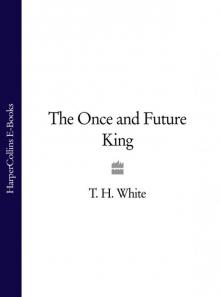 The Once and Future King (#1-4)
The Once and Future King (#1-4)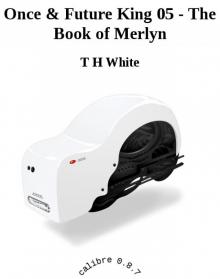 Once & Future King 05 - The Book of Merlyn
Once & Future King 05 - The Book of Merlyn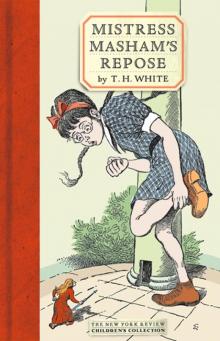 Mistress Masham's Repose
Mistress Masham's Repose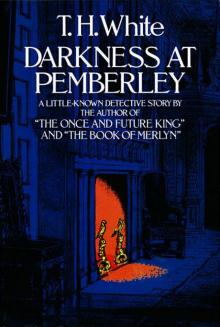 Darkness at Pemberley
Darkness at Pemberley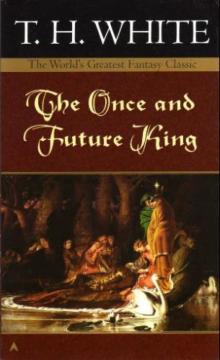 The Once and Future King
The Once and Future King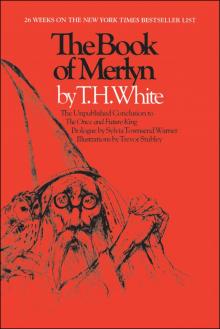 The Book of Merlyn
The Book of Merlyn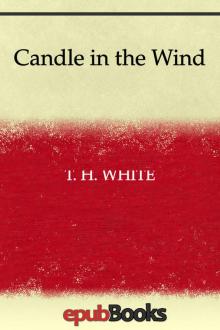 Candle in the Wind
Candle in the Wind